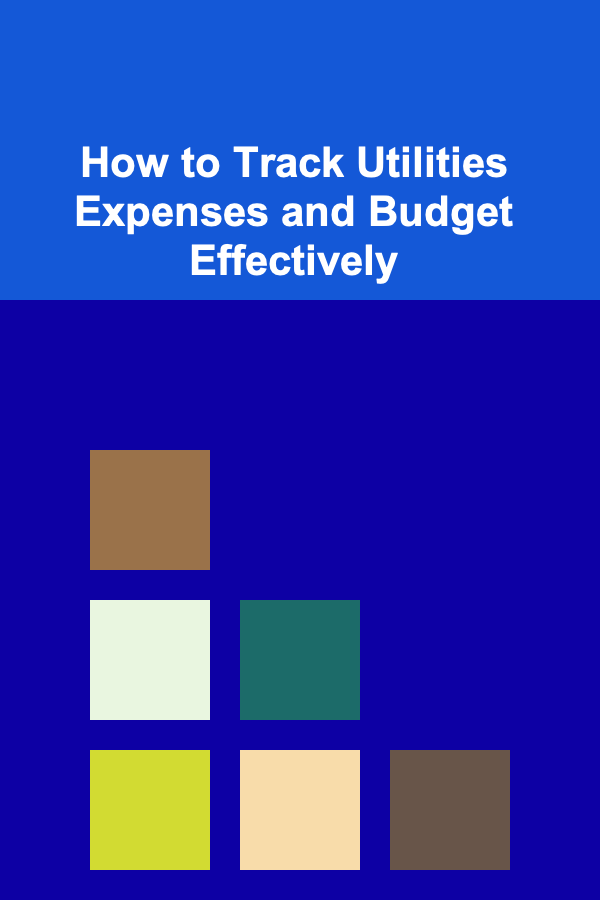
How to Track Utilities Expenses and Budget Effectively
ebook include PDF & Audio bundle (Micro Guide)
$12.99$9.99
Limited Time Offer! Order within the next:

Managing your utilities expenses is a crucial aspect of maintaining a healthy financial life. With ever-increasing utility bills, it is essential to keep track of your expenditures, understand where your money is going, and make informed decisions on how to cut costs. Effective utility budgeting can help you save money, reduce waste, and contribute to a more sustainable lifestyle.
This guide will provide a comprehensive, step-by-step approach to tracking utility expenses and budgeting effectively. It will cover the key utility expenses you may encounter, tools to track them, ways to reduce consumption, and strategies for efficient budgeting to ensure that you never feel overwhelmed by rising utility costs again.
Understanding Utility Expenses
Before diving into how to track and manage your utilities, it's important to have a clear understanding of what constitutes utility expenses. Utilities typically refer to the essential services that your home requires, such as:
- Electricity: Powering lights, appliances, heating/cooling systems, and electronics.
- Water: Supplying drinking water, bathing, cleaning, and irrigation.
- Natural Gas: Often used for heating, hot water, and cooking.
- Sewer and Waste Removal: The disposal of wastewater, sewage, and garbage.
- Internet and Cable: While not strictly a utility in some places, these services are essential for most households.
- Heating Oil or Propane: If you live in a region without natural gas, heating oil or propane may be a substitute.
Understanding the breakdown of these expenses is critical for creating a practical budget. Some utilities may vary seasonally (e.g., heating costs in winter), while others may have fixed monthly rates. Knowing what each expense entails and its seasonality helps you prepare for fluctuations.
The Importance of Tracking Utility Expenses
Tracking your utility expenses is vital for several reasons:
- Cost Management: Utility bills can significantly impact your monthly budget, and without careful monitoring, these costs can spiral out of control.
- Energy Efficiency: By tracking usage, you can identify areas where you are consuming more energy or water than necessary, allowing you to make changes and lower your consumption.
- Better Budgeting: Understanding your average utility bills and how they fluctuate over time helps you create a more accurate and realistic budget.
- Sustainability: With increasing concern about environmental impact, being mindful of how much water, energy, and gas you use can help reduce your ecological footprint.
Tools and Methods for Tracking Utility Expenses
2.1 Manual Tracking Methods
The simplest way to track utility expenses is by maintaining a record manually. This can be done using notebooks, spreadsheets, or physical files. While this approach can be time-consuming, it gives you complete control over the process. Here's how to do it:
- Create a Log: Set up a log for each utility bill, noting down the date, amount, and any special notes (such as spikes in usage or seasonal changes). This will help you track trends and changes over time.
- Keep Copies of Bills: Always keep copies of your utility bills (either digitally or physically) to reference for comparisons. Compare your past and current bills to identify unusual increases.
- Set Reminders for Payment Dates: Since many utility bills are due on a set date each month, you can set reminders on your phone or calendar to avoid late fees.
While this approach is effective, it can be cumbersome, especially if you have multiple utilities to track. Fortunately, several digital tools and apps make this process easier.
2.2 Using Spreadsheet Software
For those who prefer a more organized and digital approach, spreadsheets (such as Google Sheets or Microsoft Excel) can be extremely useful. Spreadsheets allow you to set up a template that automatically calculates totals, averages, and trends, providing a visual overview of your utility costs.
- Utility Tracking Template: Create columns for the utility type, bill date, amount, consumption (e.g., kilowatt-hours for electricity), and any notes or comments. You can use formulas to calculate monthly totals and averages.
- Visual Graphs: Use spreadsheet tools to create graphs that visualize your utility consumption and costs over time. This can help you spot trends, such as rising usage in specific seasons, and take proactive steps to reduce consumption.
2.3 Utility Tracking Apps
Several apps and online tools are designed specifically for tracking utility expenses. These platforms automatically connect with your utility providers and track your usage, payments, and trends. Some of the most popular options include:
- Mint: Mint is a well-known budgeting app that allows you to track utility expenses along with all other household expenses. It connects to your bank account and tracks payments, categorizing them into different spending groups.
- YNAB (You Need a Budget): YNAB is a budgeting app that helps you prioritize your spending and plan for future utility expenses by creating categories for each utility.
- Utility Tracker: Some utilities provide their own apps that allow you to track usage and costs, like energy usage reports from your electricity provider.
- EnergyHub: This app allows you to monitor your energy consumption, identify high-usage appliances, and track your energy-saving efforts.
Using these apps is convenient because they often provide real-time updates on your utility usage and send alerts if your consumption is higher than usual, allowing you to react quickly.
Strategies for Reducing Utility Expenses
Tracking your utility expenses is the first step, but it's even more important to take action and reduce them. Here are several strategies to help lower your utility bills:
3.1 Reduce Electricity Consumption
Electricity can make up a large portion of your monthly utility bills. The good news is that there are many ways to reduce electricity usage without sacrificing comfort.
- Switch to Energy-Efficient Appliances: Consider upgrading to energy-efficient appliances (e.g., LED light bulbs, Energy Star-rated refrigerators, washers, and dryers). These appliances consume less energy and can save you a significant amount over time.
- Unplug Devices When Not in Use: Many electronics continue to draw power even when turned off. Unplug devices like TVs, phone chargers, and kitchen appliances when not in use, or use a power strip to easily disconnect multiple devices at once.
- Use Smart Thermostats: Smart thermostats can help you better manage heating and cooling. Set the thermostat to adjust automatically based on your schedule, so you're not wasting energy when you're away or sleeping.
- Install Insulation: Proper insulation in your home can help regulate indoor temperatures and reduce the amount of energy required for heating and cooling.
3.2 Conserve Water
Water is often one of the most overlooked utility expenses, but small changes can lead to significant savings over time.
- Fix Leaks Promptly: A leaky faucet or running toilet can waste gallons of water every day. Ensure that leaks are repaired promptly to avoid unnecessary water consumption.
- Install Low-Flow Fixtures: Low-flow showerheads and faucets can reduce water consumption without compromising water pressure.
- Reduce Water Heater Temperature: Lower the temperature on your water heater to around 120°F. This will help reduce energy consumption and save money on your gas or electricity bill.
- Use Water-Efficient Appliances: If you're in the market for new appliances, consider getting water-efficient models, such as dishwashers and washing machines that use less water per load.
3.3 Lower Natural Gas Bills
If you rely on natural gas for heating or cooking, there are ways to reduce your usage and save money.
- Maintain Your Heating System: Regular maintenance of your heating system ensures that it runs efficiently, using less energy to heat your home.
- Seal Drafts and Insulate: Drafts and gaps around windows and doors allow heat to escape. Use weather stripping or caulking to seal these gaps and keep the warm air inside.
- Adjust Your Thermostat: Lowering your thermostat by a few degrees during the winter or raising it during the summer can significantly reduce your natural gas usage. Wear warmer clothing in winter or use fans in the summer instead of cranking up the heat or air conditioning.
3.4 Optimize Sewer and Waste Disposal Costs
While you may not have as much control over sewer and waste disposal costs, there are still ways to manage and reduce these expenses.
- Compost: Composting kitchen scraps reduces the amount of waste you produce, potentially lowering your garbage fees.
- Recycle: Recycling more can also reduce the amount of waste your household generates, leading to lower waste management costs.
3.5 Cut Back on Internet and Cable Costs
If your internet and cable bills seem high, there are several steps you can take to lower them.
- Downgrade Your Plan: Review your current internet and cable plans to see if you are paying for more bandwidth or channels than you need. Consider downgrading to a more affordable plan.
- Cut the Cable: Many households are opting for streaming services instead of traditional cable. Switching to streaming platforms can save you money each month.
Effective Utility Budgeting
Once you've tracked your utility expenses and implemented strategies to reduce them, it's time to create a budget. An effective utility budget will help you stay on top of your finances and ensure that utility costs don't eat into your disposable income.
4.1 Set Realistic Goals
Start by setting a budget that takes into account your average monthly utility costs and any seasonal fluctuations. For instance, electricity and heating bills tend to be higher in the winter, while water consumption might increase during the summer. Consider creating a buffer to accommodate these changes.
4.2 Categorize Your Utility Expenses
Categorizing your expenses makes it easier to see where your money is going. Separate each utility (electricity, water, gas, etc.) into its own category and assign a monthly budget to each.
4.3 Track and Adjust Your Budget
Constantly track your spending against your budget. If you notice that you're consistently going over budget in one area (e.g., electricity), take further steps to adjust your consumption or find ways to reduce that cost.
4.4 Review and Reflect
At the end of each month or quarter, review your utility budget and expenses. Reflect on any changes you've made and how effective they were. This reflection will guide you in adjusting your budget and strategies for the next period.
Conclusion
Tracking utility expenses and budgeting effectively is a crucial part of managing your personal finances. With the right tools, strategies, and a proactive approach, you can reduce your utility costs, lower your environmental impact, and maintain a sustainable lifestyle. By staying organized, tracking your usage, and adopting energy-saving practices, you can take control of your utilities and ensure that your spending aligns with your financial goals.
Reading More From Our Other Websites
- [Home Maintenance 101] How to Implement Effective Termite Control Measures
- [Organization Tip 101] How to Create a Wall-mounted Pet Supply Organizer
- [Organization Tip 101] How to Organize Your Garage Tools for Efficiency
- [Personal Investment 101] How to Start Investing in Foreign Exchange (Forex)
- [Personal Care Tips 101] How to Make a Smoothie That's Both Healthy and Delicious
- [Home Maintenance 101] Bathroom Tile Installation: Tips for a Professional Look
- [Paragliding Tip 101] Soaring Above the Clouds: The Best Paragliding Schools in Asia Offering Multi‑Week Intensive Courses
- [Personal Investment 101] The Power of Deep Learning in Affiliate Marketing: Make Passive Income
- [Home Staging 101] How to Home Stage on a Budget: Tips and Tricks for Every Room
- [Organization Tip 101] How to Organize Your Child's Backpack and School Supplies

DIY Cost-Cutting: How to Tackle Projects Without Breaking the Bank
Read More
How to Make Money Online as a Personal Organizer: 10 Actionable Ideas
Read More
How to Use a Cash Envelope System to Control Spending
Read More
How to Use Travel Pods for Organized Packing
Read More
What Should You Know About Creating an Organized Meal Prep Area?
Read More
Blockchain for Legal Contracts: A Deep Dive
Read MoreOther Products

DIY Cost-Cutting: How to Tackle Projects Without Breaking the Bank
Read More
How to Make Money Online as a Personal Organizer: 10 Actionable Ideas
Read More
How to Use a Cash Envelope System to Control Spending
Read More
How to Use Travel Pods for Organized Packing
Read More
What Should You Know About Creating an Organized Meal Prep Area?
Read More